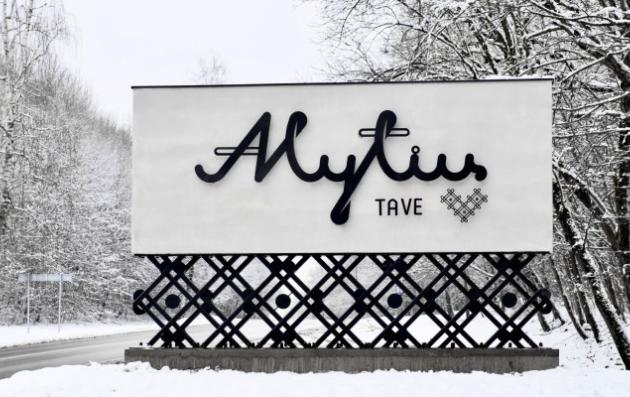Date of label : 29/10/2024
-
Alytus , Lithuania
-
Size of city : 51.856 inhabitants

A winter scene featuring a large sign.
Summary
In Alytus (LT), groups of at least 16 people can propose projects to install infrastructure in particular urban areas, such as a children's playground, a dog walking area, or a new green space. After collecting all the proposals, the municipality evaluates the legal and technical possibilities for their implementation. For initiatives with no such obstacles, a voting procedure is launched. During the voting, residents have the opportunity to familiarise themselves with the initiatives and express their opinions. The initiative with the most votes is implemented by the city.
The solutions offered by the Good Practice
Citizen initiatives in Alytus get residents involved, in coming up with ideas and voting on the best ideas, to improve their hometown. Engaging city residents is a central aspect of the Alytus City Development Strategy 2020-2030, the Alytus City Strategic Action Plan 2024-2026, and the Alytus City Sustainable Development Strategy 2023-2029.
In April 2018, Alytus became the first city in Lithuania where residents can decide for themselves what the city needs.
Between 2019-2023, 55 initiatives for the installation of various infrastructure in the city were submitted to the citizens' vote, resulting in the implementation of 13 initiatives funded with over EUR 700 000 from the municipal budget.
Each year, the municipality consults with residents and reviews the procedure for financing initiatives, so that residents can more easily submit initiatives and vote for them.
Building on the sustainable and integrated urban approach
Urban challenges – economic, environmental, climate, social, and demographic – are interconnected, requiring an integrated approach to urban development. For instance, physical urban renewal should be combined with measures promoting economic development, social inclusion, and environmental protection.
The good practice exemplies this integrated approach by evaluating citizen-submitted proposals for initiatives according to certain criteria, including:
- Inclusivity: The initiative must be aimed at a wide range of population groups, and must not discriminate against them on the basis of social status, origin, or race.
- Support for vulnerable groups: Initiatives addressing problems of people at social risk are encouraged.
- Sustainability: All initiatives are assessed from an environmental and economic point of view, and must help protect the environment and be economically viable.
All the initiatives are implemented through public procurement procedures.
Based on participatory approach
Strong partnerships involving local citizens, civil society, the local economy and various levels of government are essential, for combining institutional capacities and local knowledge, to identify shared solutions and to achieve sustainable results.
The implementation of citizens' initiatives brings together many different actors:
Residents: Involved from the start, they submit initiatives and subsequently vote for them.
Elders: The lowest level of self-government, who together with the community submit initiatives, participate in the initiative evaluation committee, and help supervise their implementation.
Municipality: Manages the entire process, from inviting submissions to the implementation of selected initiatives.
Politicians: Municipal council members draft and approve procedures for the submission, and participate in the initiative selection commission.
Active collaboration among these actors at all stages of the process is important to ensure effective outcomes.
What difference has it made?
On 19 April 2018, Alytus City Council approved the procedure for selecting and financing citizen initiatives. Between 2019-2023, 55 initiatives for the installation of infrastructure in the city were submitted to the citizens' vote. Of these, 13 initiatives were implemented with a total budget of over EUR 700 000, with the help of the municipal budget.
Completed initiatives include the installation of the “Alytus-Myliu" city gates, teenage play space "Padaužų parking lot", a concert square in the City Garden, a leisure space "Jasmine Park", a grill area in the Youth Park, a bronze sculpture of a squirrel with a nut, and others.
These initiatives promote cooperation between the community and the municipality, giving residents a sense of ownership of the city by letting them decide on the physical infrastructure that is lacking and in which places it would best meet their needs.
The approach ensures that the municipality invests in infrastructure in a way that responds to the needs of the largest possible audience. This cost-effective approach also saves the city money, as funds are not spent on infrastructure that residents would not use. Implemented in public areas, the initiatives benefit all the city’s residents.
Why this Good Practice should be transferred to other cities
The good practices is widely relevant and can be adapted to other European cities, where it can promote cooperation between the community and the local government. It allows residents to identify and address physical infrastructure needs. The process responds to the needs of the largest possible audience, optimising the city's budget because unwanted infrastructure is not funded.
The practice addresses inclusion and balanced urban development in line with:
- The Sustainable Development Goals (SDGs).
- Urban Agenda for the EU.
The practice is established by the municipality itself in its local legal act, which is reviewed annually. Therefore, each municipality can choose what is suitable from the case in Alytus and adjust it for itself.
Essential factors for a successful transfer:
- The willingness of the municipality to share the possibilities of urban planning with residents.
- The procedure for allowing residents to decide for themselves which areas of the city should be developed and how.
From 2024, Alytus has established a similar initiative to allow schools to decide on what spaces should be developed and how.
